Journalists and media houses have been described as major strategic partners in the anti-corruption campaign in Nigeria.

The media practitioners were also commended for showing concern about the need to bring corruption on its knees in a country where public officials have stolen billions of dollars mostly kept in foreign countries.
Speaking at a media roundtable held for editors in Lagos on Tuesday, February 25, 2020, Chairman, Human and Environmental Development Agenda (HEDA Resource
Centre), Mr Olanrewaju Suraju, expressed appreciation for the role the media has played in the vigorous campaign against corruption, adding that the media can still do more.
He reminded the journalists of the need to show greater commitment to the campaign against sleaze in Nigeria as a way of bringing an end to a practice that continues to harm the country’s overall development.
“Corruption is like cancer. When allowed to grow, it will end human life and destroy the fabric of human existence. Corruption is behind underdevelopment, poverty, poor public health, high mortality and infant mortality rates, violence and extremism. Any country overwhelmed by corruption has no chance of survival,” Suraju said.
Last week, HEDA said more than $4 billion have been recovered for only one individual. The group said volumes of financial transactions are highest in Lagos, Rivers and Kano involving huge volumes of cash, yet the states have no domestic anti-corruption institution.
Suraju said there have been some improvements in the fight against corruption in Nigeria, adding that the anti-corruption survey conducted by the United Nations Office of Drug and Crime (UNODC) indicated a slight decline in corruption compared with the situation in 2016. He, however, said that corruption continues to impugn the character of every Nigerian in the comity of nations.
“We recognise the strategic role of the print and electronic media in the fight against corruption. The media continues to be a major pillar in this campaign. HEDA is willing to continue to collaborate with the media to ensure Nigeria regains her reputation as the leading light in Africa against kickback and illicit asset acquisition.”
He regretted that some high-profile Nigerians accused of corruption still find their way into the National Assembly.
He said: “One former governor has 800 million pounds lodged abroad. There is a Senator that has a house worth over 6 million pounds. There is a public official whose asset declaration went up by about N34 billion, a governor in one of the states categorised as poor. There is the need to work together to fight corruption.”
He said what the EFCC is doing in Nigeria is unparalleled compared with the activities of anti-corruption institutions in many African countries.
He said: “The EFCC is doing a good job. What we have seen is increased hurdles mounted by the Ministry of Justice. There is deep concern about the commercialisation of the whistle blower policy. EFCC needs to be encouraged to do more.”
He said in the past one year, HEDA conducted 18 anti-corruption situation rooms in the six-geo-political zones of the country in its bid to energise Nigerians in the anti-corruption drive.
The group also introduced some of its latest research publications; one of which is the third edition of a compendium of 100 high profile corruption cases in Nigeria.
